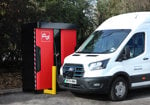For some years, remarketing has quietly gone its own merry way.
Cars run for three or four years, come in to the auction centre, get sold and go out.
Every now and again there’s a bit of a spat about the values of a certain model or sector but, thanks to a free flow of credit, buyers were always found, more or less, and used values stayed firm, and even improved.
Then last year, the bomb dropped.
Never has remarketing been so keenly monitored.
Used prices plummeted and suddenly thousands could be gained or lost, millions wiped off the value of fleets in months. It became the main game in town for any fleet.
And with a pressing need for fleets to squeeze every possible pound out of every vehicle, opportunity knocked – loading cars onto a transporter and sending them off to the trusty auction might still be the channel for volume, but any alternative is worth looking at when you’re trying to maximise return.
A number of players previously operating in the margins have stepped up.
The internet is the obvious means to a new end. It’s been simmering away for years as a sales channel, but often it has been a handy add-on rather than a core route to market.
But the recession has changed all that.
For one, if you can sell a car over the internet you might be able to get away with one or two less movements of that vehicle, which all cost time and money.
Obviously, as with all internet firms, you don’t need the same level of physical and material structure as those who sell in the ‘real world’ – nobody to cook bacon sandwiches, less lights to power or logistics chaps to drive cars on and off the block.
But one of the key reasons that internet-based sales have become more popular is that some in the industry reckon there aren’t the bodies or the money about to cover all the physical auctions a used buyer might need.
When costs are tight, any business is going to look at whether it can buy a car sitting at a desk rather than having to send someone to an auction and back again to do the same thing.
Ken Trinder, head of business development for Epyx, which runs the 1link Disposal Network, says: “I think dealers are looking at different, more efficient ways of acquiring stock.
"In the good times, they are conservative with the way they do things but when times are tougher they are more open to innovation.”
Trinder has seen the 1Link network grow – more than 250 used car dealers signed up around the start of the year, bringing the total to more than 1,250, all on the lookout for good fleet stock.
For fleets, speed of vehicle turnover is a key selling point, and this is something that becomes a recurrent theme in alternative channels.
You don’t need the metal to be at a particular place at a particular time.
In fact, you can even sell the car before it has been defleeted.
That’s a huge benefit for fleets and leasing companies, speeding up resale times and cutting costs.
More online remarketing companies are offering this facility.
Speed of turnover is a strategy employed by Carsite. Its managing director Douglas Rotberg says the company’s Preview product can market a car to retail buyers even before the leasing company has had the car back from the driver.
He said: “De-fleeting into an open wholesale market is essentially a passive process because the asset’s revenue-generating life is over and it has become a dead risk.
“Disposing even into a ‘typical’ trade market will therefore always be the passive option in comparison with marketing the vehicle while it is still earning revenue.
“Preview is a powerful way of maximising your chances to make every day count as a potential revenue earner.”
Higher resale prices
Autoquake also cuts out the trade element of the defleet and offers the cars straight to private customers though its website.
Growth has been impressive – in 2007, it sold 600 cars; in 2008, 5,000.
This year it is looking to sell 15,000-20,000. On average it sells cars in 22 days; in February this dropped to just 16 days.
Autoquake claims leasing companies and fleets can boost resale prices by an average of 14%, or £400 a unit compared to sending the car to auction because consumers pay more money than dealers who are trying to maximise margins by paying as little as possible for the car.
Autoquake is also in discussions with leasing companies about pre-selling cars before they come off the fleet.
“It means the cars will never be off-fleet – they will be sold straight away,” says chief executive Garry Hobson.
He estimates the potential for this type of online remarketing model in the UK is around 5% of the used car market, or 300,000 cars a year.
Another new player is Paragon Remarketing, which has ambitious plans to become the third biggest remarketer of cars in the UK within two years. The company starts from a volume base.
Already a massive logistics firm performing 100,000 movements a year, it stores, repairs and services thousands of cars as part of fleet demo programs as well as looking after PDI and storage for a number of rental firms’ vehicles.
According to managing director Steve Maltby, adding a remarketing function to the existing core competencies was a no-brainer.
“We’ve put in place a team of experts from the remarketing industry,” he said. “It’s a natural progression for us – we have the space and the ability to do this.”
Maltby says 1,500 buyers had already signed up to twice-weekly internet sales, and reckons the firm’s no-fee deal will prove attractive.
The empires strike back
Don’t expect BCA and Manheim to sit back and watch market share nibbled away by a number of smaller, but voracious players.
As the leaders in the market, they are hard at work countering the threat.
As fleets and leasing firms look to spread their risk across as many channels as possible, they are intent on offering as many routes to market as possible themselves.
BCA’s Tony Gannon says: “Our experience tells us that many large vendors want to use a range of channels to market and our role is to make sure we offer those alternatives ourselves.
“To that end, BCA offers wholly online and Live Online channels, stock market systems, wholesale systems, integrated logistics and inspection packages and a range of electronic remarketing and onward marketing solutions for vehicle manufacturers and their dealer networks, leasing companies, fleet operators, governments and local authorities and every sector of the motor trade.”
Manheim offers similarly dynamic levels of innovation. Mike Pilkington, managing director of Manheim Auctions and Remarketing, adds: “By marrying the traditional physical auction with online bidding, we have taken effective but traditional wholesale methods into the 21st century.”
So does alternative just mean small? BCA reckons that its volumes through the sorts of channels the new breed are targeting are already vast.
Gannon says: “The reality is that we are already selling more vehicles by ‘alternative’ means than any of the alternative remarketers.
"We will sell more cars electronically in a month than many alternative players will sell in a year.
"It just so happens that we also sell several hundred thousand cars, vans and trucks by traditional auction methods.”
And Gannon, perhaps not surprisingly, reckons physical auctions are here to stay, no matter what improvements and development in online occur.
“Some buyers simply have to see the car for themselves before they buy.
Physical auction is unsurpassed in dealing with large volumes of used vehicles and getting them sold quickly and efficiently,” he says.
“BCA will sell around 13,000 vehicles this week by physical auction, and that’s without considering the other physical auction companies operating in the UK.
Nothing else comes close to having that sort of capacity and therefore it is difficult to see an alternative channel rising up and swallowing that sort of volume each and every week.”
Pilkington is equally adamant that traditional forms of remarketing are still viable, saying: “We will never lose sight of the fact that the traditional auction model is a tried and trusted wholesale channel, preferred by many thousands of buyers and very much here to stay.”
Alternative remarketing: Useful niche or volume player?
by Rob Hester, valuation relationship manager, CAP
“I think it will be a long time before online becomes an major channel for many retail buyers to buy used cars – they just don’t work that way because they like to enjoy the experience, be touchy feely and feel they’ve negotiated a deal, all of which you struggle to get over the web.
“But for traders to buy a lot of fleet stock online is a much more likely outcome.
"There are already an increasing number of buyers doing it, especially in the closed manufacturer sales.
“How successful these alternative channels are depends on trust – if you are sure of the quality of stock then you will pay the money.
“And with some of these remarketers offering to take the vehicles back if you’re not happy with it, there’s no risk.
“If you’re an independent dealer and you can buy all your stock from your desk rather than having to spend a day travelling to and from an auction you can see the appeal.
















Login to comment
Comments
No comments have been made yet.